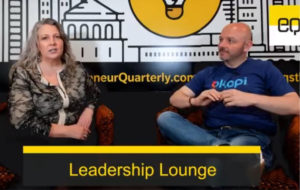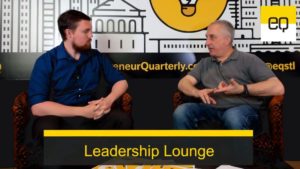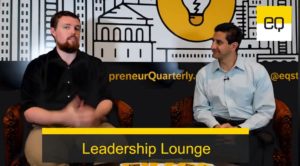
From Humble Beginnings: The Conference Built On Social Media
Facebook is riding into town with MDMC.
What started out as a university department experiment, 6 years ago, has grown from a passion project into the fastest growing marketing conference in the Midwest.
Admittedly, “the fastest growing marketing conference in the Midwest,” might be a contentious accolade. There just aren’t that many marketing conferences in the Midwest, in general.
But that’s kinda my point. The phrase is deliberately on the nose because conferences are complicated and hard to produce.
And and they’re even harder to pull off just with volunteers. But this midwestern marketing conference has done exactly that.
The Midwest Digital Marketing Conference, better known as MDMC, was recently listed on Forbes as one of the top marketing conferences to attend in 2018. The two-day event will be taking place at Union Station in St Louis at the end of this month, on the 27th and 28th of March.
MDMC holds the unique position in the marketing conference world for being run as a non-profit. Making it eminently more affordable than most digital marketing conferences.
Run as a stand-alone brand, MDMC is powered by UMSL Business’s digital marketing faculty. The conference is exclusively organized by unpaid volunteer work from teachers, department heads, faculty board members and students. This setup lends a unique breadth to the conference programming as it seeks to emphasize equal opportunity and democratize access to experts for all attendees.
EQ sat down with the conference organizers, Dr Perry Drake, Brianna Smith and Charlie Hoffman to learn more about the origins of what they now affectionately term, “a massive monster.”
A Mission Driven Marketing Conference
MDMC’s non-profit status allows the conference to share UMSL’s mission driven values of preparing attendees for the future of work. Dr. Perry Drake, founder of MDMC and Assistant Professor of Digital Marketing at UMSL Digital told EQ, “our aim is to offer fantastic content and insights that you can take back to your boss and put on your resume.”
Compared to typical marketing conferences that charge thousands of dollars per ticket, MDMC’s ticket charge is less than $200, a price point designed to be accessible to jobseekers, career switchers and the unemployed. Yet, to any marketer wanting to swot up on the latest digital marketing strategies from marketing brands, platforms, agencies, search engines and social networks, the low ticket price represents incredible value to industry veterans and newbies alike.
MDMC’s non-profit status has also provided an elegant solution to attracting major sponsors and exhibitors, such as Google and Facebook, to a region that these tech giants have had little incentive to directly engage over the years.
The costs of sponsorship are tax deductible: creating a win-win-win for both UMSL students, MDMC attendees and MDMC sponsors, who can not only expect to expand brand reach but also find their next generation of employees.
The funds generated from the conference go straight back into providing scholarships for at-risk or lower-income students and UMSL Digital curriculum development. In recent years, UMSL used the profits to buy podcasting equipment and build a video studio complete with a production and editing suite.
As a result, students have been able to gain first hand experience producing the latest media formats in their social media strategies class. Recently, they even launched their own “InYourBusiness” podcast in collaboration with sister faculty, UMSL Business.
For Drake, teaching his marketing students to be media literate and cross functional in all digital formats is incredibly important.
“Social media has changed how marketing teams work. There are no more silos made up of lots of small roles, or jobs where you just get to have ideas. You actually have to do them now. It’s more exciting and yet scary too. Nowadays, marketers have to navigate the process from concept to production and delivery. So, we’re teaching our students how to be producers, directors, curators and distributors. The future is cross functional marketing teams who can work on every channel.”
Providing Hands On Experience
UMSL’s mission and Drake’s promise to students gets doubly fulfilled in the execution of MDMC too. The entire event is produced by unpaid volunteers, made up of students, teachers and program directors.
From liaising with guest speakers and sponsors, to setting up booths and finalizing the panel session titles or conference agenda, UMSL Digital students, “navigate the process from concept to production and delivery.”
Charlie Hoffman, Dean of the UMSL College of Business, explained to EQ, “It really all goes back to Perry. He gets students so excited about this stuff and got this thing going from, what was, a very modest beginning. Now, this year we’re expecting 2000 people to show up. I mean we’re going to run out of places to hold this event!”
The conference first started on the UMSL campus and attracted around 425 attendees – all through word of mouth. It wasn’t until the second year, when attendance spontaneously doubled that the team realized that if the conference kept expanding in future, there just wasn’t going to be enough parking on campus.
“Having to change venue was a big milestone for us” Hoffman continued. The solution came from an UMSL graduate alumni – now the owner of Union Station – who offered host MDMC in downtown St Louis for their third year.
Reflecting on what it’s taken to bring MDMC into its sixth year, Hoffman noted that the UMSL Digital curriculum advisory board members do not fit the typical profile compared to the University’s other six advisory boards. Where most UMSL advisory board members are successful retirees, the average age of the marketing advisory board is around 30.
Hoffman said, “I think our board had a big impact. Because it is pretty much marketing people from most of the movers and shakers in St. Louis. The early participants were all those companies that have a vested interest in how we’re doing. And then – word of mouth – and they told other companies and they told other companies. It kinda grew organically like that.”
The Friend Network
“It was all social media that built this thing. It’s not traditional advertising.” Hoffman concluded.
The humble beginnings he alluded to are an understatement at best. Considering they’re now expecting 2000 attendees this year, MDMC’s origin story aptly demonstrates the true organizing power of social networks and social media.
“I really didn’t have a conference on my mind… It just kinda happened,” Drake explained in a student run podcast for UMSL Business.
Prior to joining UMSL in 2013, Drake had been working in New York for 14 years at NYU where he had made many friends in the digital marketing industry. To kick off the new digital strategies curriculum he was teaching in St. Louis, he invited his former colleagues to present a webinar to his students.
But they suggested going one better — and offered to fly out to meet with them face to face.
“I just said to myself, hey if you’re going to fly out here to present to just 30 students. I’ll put you in front of more than 30 students.”
With that conviction Drake, “worked social media really hard,” and pulled in over 425 professionals via Linkedin and Twitter to join a free half day event. The conference evolved from there.
Brianna Smith, Executive Director of MDMC, shared a similar sentiment. When she originally joined that half day event as an attendee, little did she know that she would go on to become the conferences’ chief organizer and co-ordinator, every year, for the next six years.
“I was trying to tweet all the takeaways, and I was tweeting too fast and too much, and they thought I was spamming,” Smith explained. She was hastily live tweeting all the insights from the discussions of the day, so much so, that the Twitter spam detection algorithms thought she was “a bot” and temporarily suspended her account.
Unsurprisingly, silencing her had precisely the opposite impact and led to a rising clamor among the audience to, “Let Brianna out of Twitter Jail!”
Inadvertently, the suspension would crown her as a local mascot and prove to be a defining moment for the upstart conference – a symbol that the event was punching a whole class above its weight.
Bridging The Gap Between The Mississippi Valley And Silicon Valley
Now in its sixth year MDMC has proven it can consistently attract major companies like Pinterest, Google and Snapchat to address a region previously ignored by the tech community.
But I can think of no better proof that MDMC has been an effective broker in the relationship between this city and Silicon Valley than the fact that Facebook has chosen St. Louis as their first stop in a 30-city tour dubbed “Facebook Community Boost.”
In the summer of 2017, in the wake of the fake news controversy ravaging Facebook, Mark Zuckerburg publicly announced that his company would do more to support local communities and promised to launch a community outreach initiative. That’s what Facebook Community Boost is. And the first community they’ve chosen to boost is St. Louis.
It seems more than a remarkable coincidence that the tech giant would find it suitable that their maiden voyage should coincide with MDMC, in lil’ ol’ St. Louis.
Whatever you call it, to me it demonstrates the ‘halo effect,’ the ‘tipping point’ or the ‘critical mass’ that all digital marketers strive for – that your product becomes a launch platform for others.
A Platform For Marketers In The Region
To put MDMC’s six years of achievements into context, permit me to share some of my own experience.
As a digital marketer myself, I can speak from experience, not as a conference founder, but from working closely with other conference founders from Search Engine Strategies, Incisive Media and more recently the Growth Marketing Conference.
In conference founder’s circles it is well understood to be notoriously difficult to build a successful conference. That’s because attracting and organizing lots of people into one space is an inherently complicated and costly endeavor that normally can only be justified by high ticket prices ranging from $1500 to $2000. They’re a luxury buy in most industries.
A successful venture relies heavily on meeting the challenge of reaching large audiences with strong networks that share a common cause, as attendance typically grows by word-of-mouth. Meeting that challenge is especially difficult in our mobile-first world, when mass-media formats like print and TV have been eclipsed by mass-personalization formats like search engines and social media.
It’s just logistically harder to reach large audiences with common interests these days. Which is why most industry conferences are typically created as product lines of media companies that are aimed at audiences of an already successful business publication. Or nowadays, as has been the emerging trend (as a result of the internet decimating news organizations), they tend to be “customer conferences,” run by gigantic software companies with thousands of users.
So, with all these factors in play, conventional wisdom among event industry professionals says that you should expect your conference to become profitable after three years of running it at a loss. In that sense, the business of conferences closely resembles that of a startup burning through raised capital and sprinting to achieve scale.
Happily though, MDMC shot through those inevitable growing pains in their fourth year (2016) and has turned a profit from their last two events.
All of which makes 2018 a pivotal year to define the next three years of the conference. In many ways, MDMC now looks like a flagship example of successful intrapreneurship in the St Louis startup ecosystem.
For The Culture
MDMC’s quite literal journey from zero to hero marketing conference transforms the possibilities and opportunities in St. Louis for so many of us who are not scientists, developers or startup entrepreneurs. Those of us in services businesses: the types of businesses that eat what they kill. Put another way, normal businesses.
Their story should be especially encouraging as the founding vision for MDMC is that it’s not ‘just an UMSL thing’ – instead it’s its own brand, and has been conceived from the outset as a project for St. Louis.
Furthermore, that ideal is written into it’s organizational DNA. The conference has been put together by talent and contacts donated from a St Louis based advisory boards and local talent pools. Taking on the character of a festival, MDMCs flat organizational structure absorbs potential collaborators at every level and transforms enthusiastic attendees into functional roles collaborating on future events.
In it’s truest sense, MDMC has been put together for the people by the people. And yet, most importantly, it’s one of the few examples of a conference in St Louis that actively looks out towards the rest of the world. It’s not a conference about St. Louis, it’s a conference for St. Louis and the midwest in general.
We should cherish their achievement as we would our own, because there is no other platform to highlight the region’s digital marketing talent right now. There’s no platform to foster new talent, whether it be for in-house house or remote workforces, nor is there any other platform attract the biggest tech companies in the world to come and play here all at once.
MDMC has not only earned us the consideration of Facebook of Google, but they have slashed the opportunity cost of tech giants engaging the city too.
And whatever makes it easier for the Valley to visit, en masse, future proofs the future of work in our region.
The Midwest Digital Marketing Conference takes place on 27th and 28th of March at Union Station in downtown St Louis. Get tickets here or catch our previews with some of the guest speakers at the event: Cami Thomas and Tyler Kelley.





